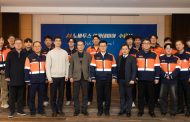Ulsan city has secured the foothold to accelerate manufacturing innovations, as it has recently been recognized as a global Advanced Manufacturing Hub (AMHUB) by the World Economic Forum (WEF), for the first time in Asia and for the ninth time in the world.
On September 7, UNIST, in collaboration with Ulsan city and WEF, organized the ‘Ulsan AM Hub in Collaboration with World Economic Forum’ at UNIST Industry-University Convergence Campus.
The Advanced Manufacturing Hubs (AMHUBs) is one of the core projects of WEF and is a regional global network that supports small and medium-sized companies to quickly change their manufacturing methods in response to the innovative technological development of the Fourth Industrial Revolution.
To date, about 8 regions in 7 countries, including Basque Country (Spain), Copenhagen (Denmark), Istanbul (Turkey), Lombardi (Italy), Michigan (USA), New England (USA), Queensland (Australia), and Sao Paulo (Brazil) have been selected to accommodate growth in the advanced manufacturing sector. And Ulsan city has been recognized as a WEF AMHUB, for the first time in Asia and the ninth in the world.
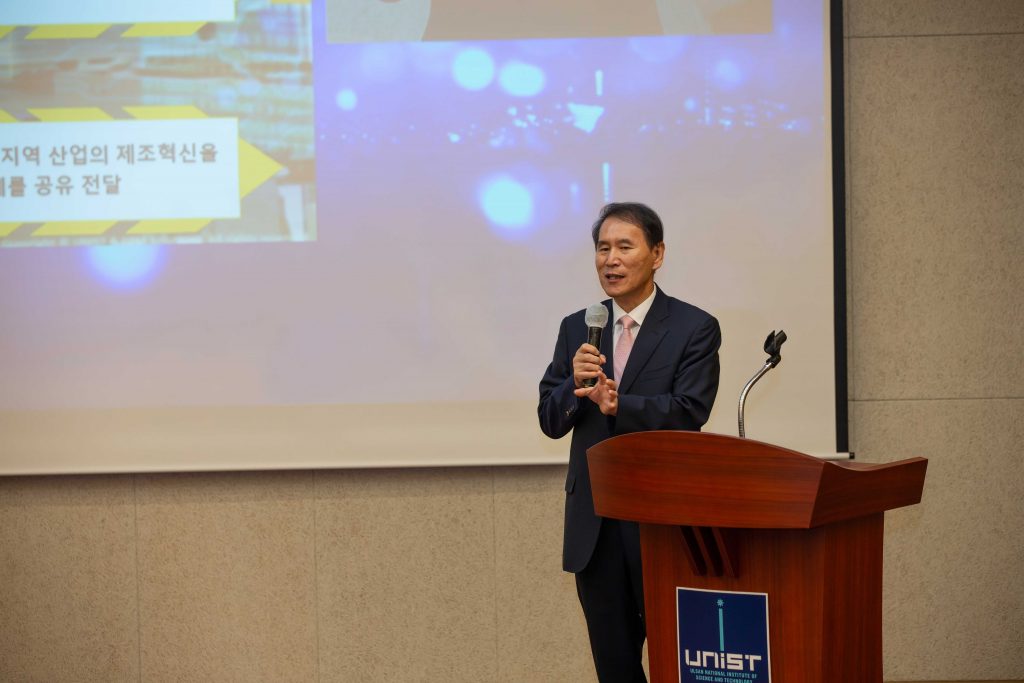
Dean Dong Sub Kim of the College of Info-Bio Convergence Engineering (Director, UNIST Institute for the 4th Industrial Revolution) delivered keynote speech at the Ulsan AMHUB in Collaboration with World Economic Forum, held on September 7, 2020.
Ulsan city, being the center of manufacturing industry in S. Korea, will share the process of digital transformation of traditional industries, and alsopreemptively implement skills and experience of the global innovation cities in the manufacturing sector. This will help accelerate digital transformation across various industries (i.e., Automobiles, shipbuilding, and petrochemicals), and thus laying the foundations for global competitiveness.
The forum began with the keynote speech by Francisco Betti (Head of Advanced Manufacturing and Production, WEF) and Dean Dong Sub Kim of the College of Info-Bio Convergence Engineering at UNIST. The aims of the forum were to exchange ideas and to share one another’s experiences and best practices of smart manufaturing, centered on Ulsan. This was followed by a panel discussion on mapping out the future for Ulsan-specific smart cities and the role of AMHUBs during that process.
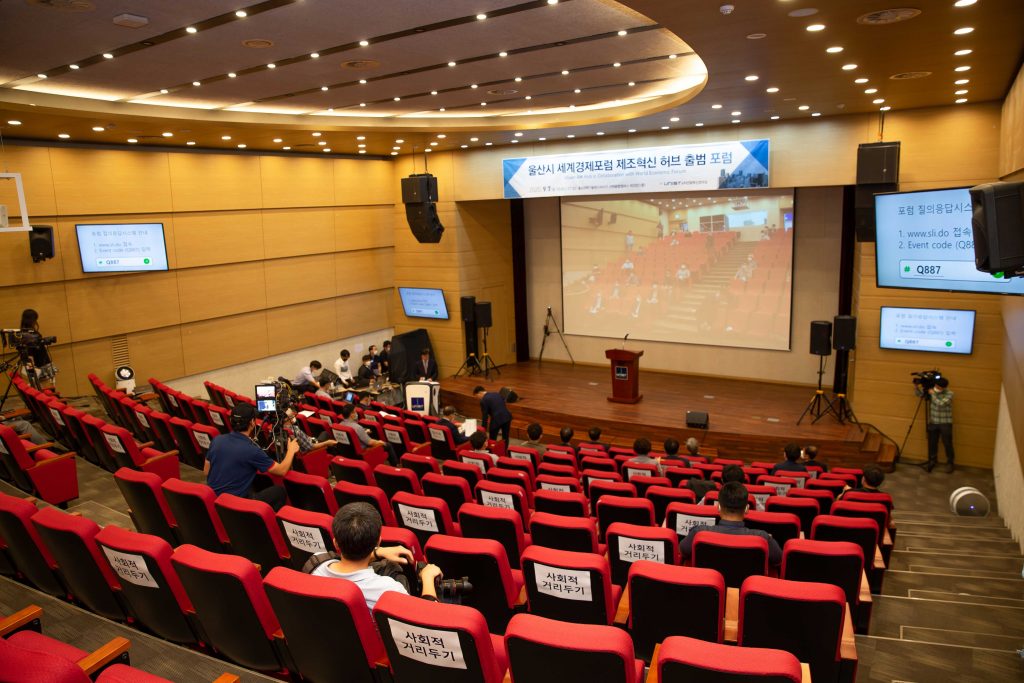
Due to COVID-19 pandemic, the forum was held in a new hybrid meeting format, a mix of remote and in-person.
“The Advanced Manufacturing Hubs (AMHUBs) of WEF aims to successfully transform traditional industries into industry frontrunners, through an effective digital industrial transformation,” says Dean Dong Sub Kim (College of Info-Bio Convergence Engineering, UNIST). “This forum will be the first step towards transforming Ulsan into an industrial smart city.”
Among many successful practices and initiatives shared at the forum, there include some notable ones: POSCO (i.e., Becoming the first S. Korean firm to join WEF’s global Lighthouse Factory) and Korea Shipbuilding & Offshore Engineering (i.e., Digital twin-based manufacturing innovation). The Hankuk Mold Co., Ltd. and KPX Chemical Co., Ltd. also shared theirbest practices in quality management for achieving quality and process innovation through close cooperation with UNIST.
Discussions continued on how to respond to changes in the industry and the workplace in a post-COVID world. The panel of experts explained about the creation of a digital-based manufacturing innovation cluster, as well as non-face-to-face technologies such as remote inspection and test operation, and emphasized the importance of shared growth between large and small and medium-sized companies to realize this.
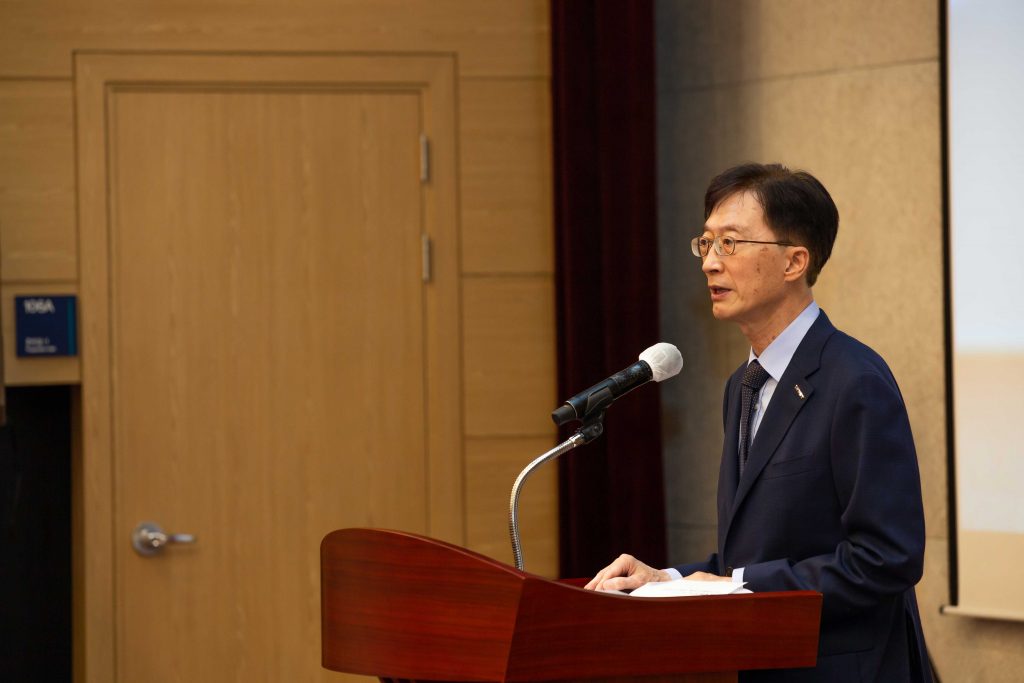
UNIST President Yong Hoon Lee delivered remarks at the opening of the Ulsan AMHUB in Collaboration with World Economic Forum, held on September 7, 2020.
Meanwhile, the forum has been organized by Ulsan city and hosted by UNIST, in collboration with WEF, which has its headquarters in Geneva. Due to COVID-19 pandemic, the forum was held in a new hybrid meeting format, a mix of remote and in-person. This is essentially an in-person event with less than 50 attendees that also includes virtual components. Through this, more than 100 participants, including the committee members of Ulsan U-Forum, as well as those companies involved in the World Economic Forum and Ulsan AMHUB.


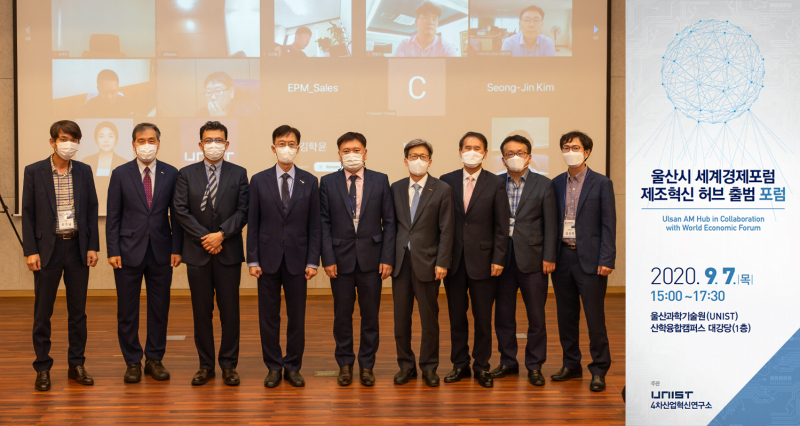







![[2026 Matriculation] UNIST Welcomes Class of 2030!](https://news.unist.ac.kr/wp-content/uploads/2026/02/사진-박종래-UNIST-총장이-2026년-입학식사를-전하고-있다-2-190x122.jpg)
![[2026 UNIST Commencement] UNIST Confers Degrees to 883 Graduates](https://news.unist.ac.kr/wp-content/uploads/2026/02/사진-2026학년도-UNIST-졸업생들이-학사모를-위로-던지며-졸업을-축하하고-있다-1-800x413-190x122.jpg)
